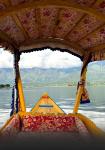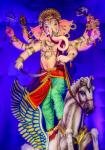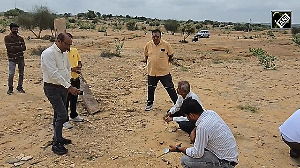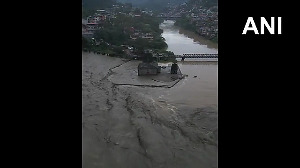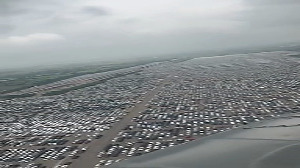A group of monks on Wednesday embarrassed the Chinese government by staging an emotional protest demanding the return of the Dalai Lama in front of journalists escorted by the government to western China, in the second such instance of defiance since the Tibet unrest erupted.
About two dozen monks began shouting slogans in Tibetan in front of a visiting team of 11 reporters at the monasteryof Labran in Gansu province, which was hit by anti- government riots by Tibetans after the outbreak of the most vicious anti-China protests in two decades in Lhasa on March 14.
The monks shouted, "We want human rights, we want the Dalai Lama back. We want to preserve our religion and culture" during the incident that lasted 10 minutes, according to a visiting western reporter.
They later dispersed after senior monks intervened.
The tour was "interrupted" by a group of lamas at the Labrang Lamasery in Gannan Tibetan Autonomous Prefecture but it resumed soon, official Xinhua news agency said.
It gave no other details of the incident, a broad replication of foreign media tour disruption two weeks ago during a government-organised tour for reporters to Lhasa for the first time after riots broke out in the Tibetan capital.
A group of monks had made a dramatic appearance at a media briefing, cried and complained that there was no religious freedom and the government was "telling lies".
The Tibetan unrest has left 20 persons dead. The Tibetan government in exile claims the toll is 150.
A top Tibetan official, meanwhile, said in Beijing that the monks who spoke to the foreign media reporters in the first trip at Jokhang temple were not punished.
"They are still in Jokhang temple and will be (there) if they do not participate in any law breaking activities," the Tibet Autonomous Region government Chairman Qiangba Puncog said.
"I think it is natural for some lamas to have their own opinions and talk to the media," he said, adding, "but what they said is not true."
"China was ruled by law and would not punish anyone for expressing opinion to the media," he said, but added, "If they commit any crime, it is another issue."
Qiangba said foreign reporters could still visit Tibet after fulfilling relevant procedures.
"For safety concern, foreigners and foreign media need to follow relevant regulations of China. We neither want to restrict media coverage nor have we anything to cover up," Qiangba added.

